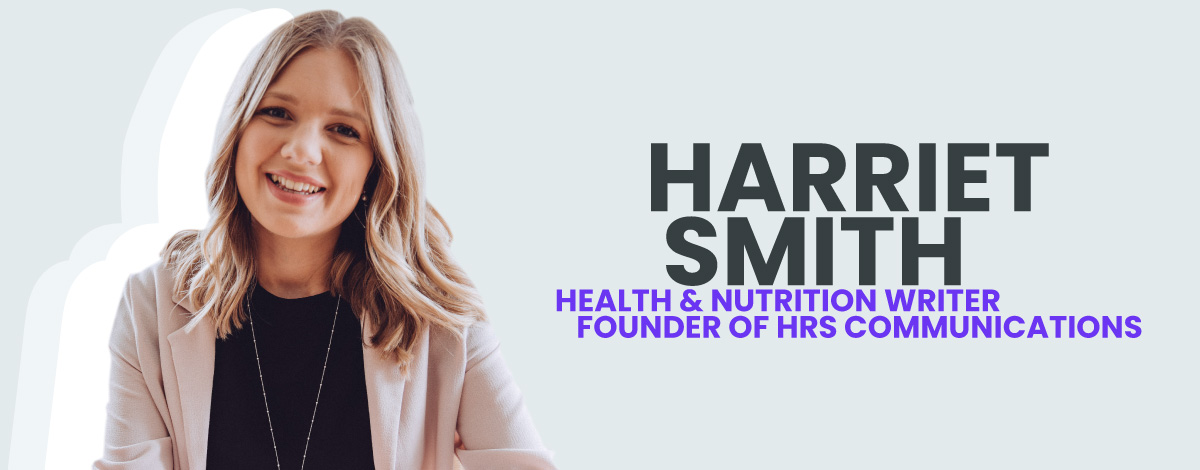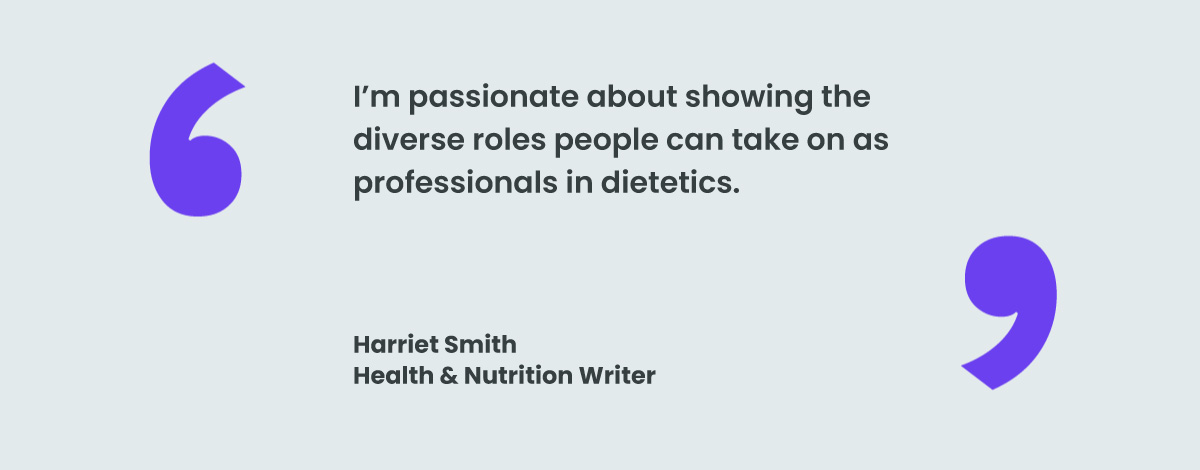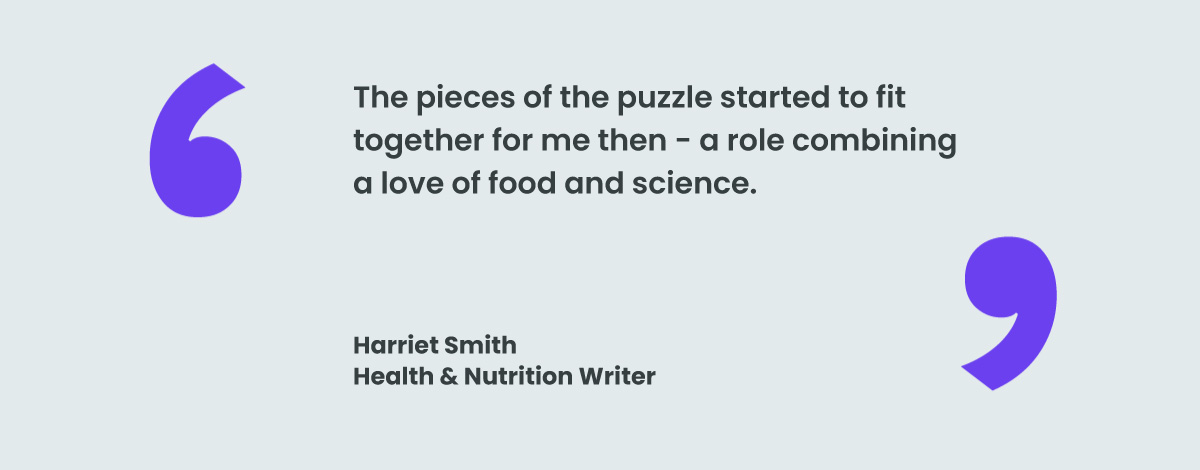Reflections with Julia: ‘I’m passionate about showing the diverse roles of professionals in dietetics’
09 Jun 2021Interview
We caught up with Harriet Smith, founder of HRS Communications, to explore her role as a health and nutrition writer. Her inspiring career journey shows that there are many more options available to dietitians beyond clinical practice.
During her final year of a BSc in Nutrition and Dietetics at King’s College London, a health condition diagnosis led Harriet to pursue a dietitian role outside of the NHS. Harriet, a BDA and HCPC-registered dietitian, now has over six years of experience writing for health professionals, consumers, industry and the national media. She has also been a columnist for the Complete Nutrition Magazine, where she won the Writer of the Year award in 2018.
Her nutrition communications agency, comprising a small team of internationally recognised registered dietitians and nutritionists, produces evidence-based content for impactful food, nutrition, and medical nutrition brands globally.
Julia: In your story on the HRS Communications website, you mention an inherited entrepreneurial streak for writing - from where did that arise?
Harriet: “My parents’ careers definitely influenced me to a degree: my dad runs his own business in corporate events and publishes a magazine; I always observed him and helped out with his events as I was growing up. My mum also has a PR and marketing background.
“When I was at uni I was one of those geeky people that loved writing essays and couldn’t wait to do more of them. I tended to get better marks on my writing assignments than in any other areas of my course. So I started out as a student columnist for Complete Nutrition Magazine, helping to educate fellow student dietitians. I also pursued an internship at a PR agency in its Health team, where I really began to see that I could combine my scientific degree with my communications and writing skills.
“This period was a real journey of self-discovery for me, working out where my strengths were and how I could combine all of these. Now, with my own agency and the growth of the business, I don’t do as much writing: I have a team of 15 freelance writers with a unique myriad of skills, most of whom are qualified health professionals, but I still have a lot of control over the editing (my Type A personality insists on it!).
“My agency works on all different forms of copy and communications, from articles to brochures, patient information leaflets to podcasts. Our main pillars of work are content strategy, content management, and brand outreach. We’ve also added a service around helping our clients understand and adhere to the regulations around health and nutrition claims. One of our team, Dr Catherine O’Sullivan, has upskilled us all on this topic and we now understand how careful you have to be to stay compliant with legislation.
“I also do a lot of writing for healthcare professionals and medical nutrition companies, sharing cutting-edge research into relevant disease areas and clinical topics.
“Writing gives a great opportunity to educate and inform the reader. It’s a skill that comes with practice and is something you can build on. I’ve found it’s so important to work with different editors and writers as it gives you fresh perspectives.”
Reflecting on when you first decided to become a Health and Nutrition writer, has the experience met any expectations you had back then?
“The journey has been very unexpected. I’ve learned that you can’t be an expert in all areas; you need to review where your skills best lie. Is it in writing for consumers or for healthcare professionals? Do you need to bring in other experts? I wanted HRS Communications to be structured just like a hospital setting, with specialists in each topic area.
“I’ve learnt that writing is a very subjective thing: what you might consider a great article, someone else may not. It’s so important to understand the client, their tone, and the call to action. If you aren’t able to reflect the tone of voice, the chances are they won’t be happy with it.
“It’s quite a skill to be able to translate complex topics into easy-to-understand, consumer-facing copy. PR companies often come to us to help with nutrition and health-related content because, as dietitians, we are incredibly qualified to talk about this area.”
How much work does your company do in supporting the NHS with their communications?
“We don’t directly support the NHS, but do so indirectly by working with medical nutrition companies to support their content creation. For example, writing disease or clinical-focused articles relating to a client's product range.
Sixty percent of our writing is focused on healthcare professionals, such as developing online e-learning modules on different disease areas and collaborating with dietitians to put these together, or carrying out interviews with healthcare professionals to build brand awareness.
“One of my favourite areas to work on is academic medical writing, where we work with clinical papers or transform webinars into bite-sized information for healthcare professionals who just want to know quick, key points. This might be through developing a factsheet or poster, for example.
“The other 40% of our work is consumer-focused, for example, writing about consumer food products such as juices, cereals, or dairy, nutrition and health claims around nutrition supplements, and health guides for weight management services or specialist charities.
“I also work with private healthcare clients like Bupa, writing consumer articles which go out to all companies that sign up with them for corporate employee health and wellbeing packages.
What challenges, if any, do you think that your peers in the Dietetics industry face when it comes to accessing and carrying out CPD?
“Every dietitian lives in fear of being audited by HCPC, but it’s a very important part of being a registered dietitian.
“My understanding is that you have to do CPD relevant to your specialist area, so for me, that’s working in nutrition communications.
“HRS Communications produces a lot of the traditional dietitian content and CPD endorsed by the BDA. There is a lot of guidance out there for traditional dietitians and more opportunities to engage, with free webinars and online courses. But I feel that more support is needed for people working in the wider industry and in charities.
“More information, reassurance, and hand-holding to guide you through the process would be helpful, even in terms of keeping records. If you don’t have a specific clinical area to work in, more guidance would be helpful.
“I’m looking to set up a journal club for my HRS Communications team to help us all with our CPD.”
We first came across you because of the Dietitian Cafe Podcast. What led you to set this up?
“I’d engaged with the medical nutrition company Nualtra on Twitter and started doing some writing for them, then decided to set up the podcast. We’re currently planning our next season of episodes, which will run from September to January.
“I love to hear what other people in the industry are doing, and I’m keen to expand my professional network too. Being someone that hasn’t taken a traditional route in dietetics, I’m passionate about showing the diverse roles people can take on as professionals in dietetics.
“We speak to people in charities, private health, and PR, as well as influencer dietitians. We were really fortunate to get the BDA onto the podcast during the pandemic promoting all the work dietitians have been doing in the crisis: we spoke to Andy Burman, Chief Executive of the BDA, and Caroline Bovey, Chair of the BDA.
“What’s great is that people now approach us to come onto the podcast. A few NHS departments have been in touch, and we did an episode with the forensic service who were looking to recruit. It was nice to be able to give them a platform to share their insight with other dietitians.
“Healthcare professionals can be quite reluctant to engage with brands if they’re too salesy, but all of the content we create through the podcast is to educate and support them with their CPD.”
You’ve covered a vast range of interesting topics on your podcast. Which have inspired you the most?
“Recently, we’ve focused on improving diversity in dietetics, so we did an episode on ethnic diversity. We have an episode coming up on “Where are all the men in dietetics?” and we’re also going to be looking at disability.
“The episodes challenging the perception of what a dietitian is are also really inspiring - they are broader in terms of the areas people can get into in the field.”
In all the conversations you have had with dietetics professionals over the last year, especially, has there been anything that has particularly struck you regarding their work during the pandemic?
“The resilience of dietitians has really shone through. Most dietitians have had to adapt their work in some way, whether it’s going back to clinical practice, being upskilled, or being a student and having to study remotely. People have just got on with it. The impact on mental health has been interesting - we did an episode of the podcast where we talked about the effect of being in a hospital full of COVID patients.
“There have also been advances in care, for example, where Claire Lewis fits complex feeding tubes for patients as a surgical procedure - it shows how dietetics services are advancing.
“Student learning has also been very affected, but it has led to a lot of upskilling.”
The story of your career journey is very inspiring to others. But what or who inspires you the most?
“All the dietitians that I speak to in the podcast are inspiring to me, but I think it’s the first dietitian I ever came across that has had the most impact on me. After major spinal surgery and losing a ton of weight, I saw an NHS dietitian. She was kind, took her time to explain the importance of good nutrition on recovery, and helped steer me in the right direction with some simple education.
“This was when I first discovered the role of a dietitian. The pieces of the puzzle started to fit together for me then - a role combining a love of food and science.”
If you could go back in time to your student-self, what piece of advice would you give yourself?
“Don’t panic; everything works out for a reason. Don’t worry if something isn’t right for you - stay true to yourself. Working in the NHS wasn’t right for me; I was diagnosed with a hypermobility condition in my final year of uni, so being on my feet in the wards wasn’t conducive to good health.”
What myth would you say most irritates dietitians?
“The misconception that dietitians just dish out diets and help you lose weight - wearing white coats and telling you to eat lettuce and apples. We also love cake!"
You are stranded on a deserted island. You can take a lifetime supply of one snack...name that snack?
“I love anything salty...crisps...marmite...so it’s got to be marmite crisps!”
A huge thank you to Harriet for taking the time to reflect with us on her experience. If you enjoyed this article and found it a valuable insight into the life of a dietitian, please share it on Twitter.
Julia helps you record, reflect, and report on your CPD through our website and app.
It's an easy way for you to stay on top of your CPD. Sign up for a 14 day free today.


